- Home
- Robert Graves
The Anger of Achilles: Homer's Iliad Page 6
The Anger of Achilles: Homer's Iliad Read online
Page 6
Then he bellowed at the crowded benches: ‘Fools, rascals—women, not men—you should be ashamed of your softness! Go home, as you intended, and let this fellow Agamemnon gorge himself on his prizes of honour! That would soon teach him how much he needs us—especially after putting Achilles, a far finer soldier, to shame by robbing him of his award in that brutal fashion. Of course, Achilles has swallowed the insult; so he can hardly have felt much resentment, else Agamemnon would not still be alive and as presumptuous as ever.’
Odysseus, an impressive personage, walked straight across to Thersites, looked him sternly in the eyes, and said: ‘Hold your tongue, you irresponsible windbag! Nobody here is attacking royal prerogatives; and since, in my view at least, you are the meanest member of the whole army landed here under Agamemnon and Menelaus, you had better keep kings out of your nasty talk and show less eagerness to raise the siege. The situation may be obscure—who can tell whether we ought to end this campaign or continue it?—but I will not allow you to taunt the High King with accepting the awards we have voted him. Let me hear any more of your nonsense, and I shall strip off your cloak and tunic, drive you in tears down to the ships, beating your naked buttocks as you ran! May this head be taken from my shoulders—may I be denied the title of Telemachus’ father—if I fail to make good my threat!’
So saying, he raised the royal sceptre and belaboured Thersites’ hump with it. Thersites shrank back, and a big tear coursed down one cheek—for the sceptre had left a bloody weal where it struck—then he subsided in pain and confusion, threw a helpless glance around, and wiped the tear away. His comrades, though regretting the violence, mocked at him, and some exclaimed: ‘Odysseus may be an eminent strategist and tactician, but his silencing of this chatterbox is by far the kindest service he has done us. Depend on it, Thersites will never again presume to slander a divine king!’
Odysseus then made an address. Athene, disguised as his herald, called for silence, so effectively that even those seated farthest off could catch every word of the speech. He said earnestly: ‘Son of Atreus, these troops intend to make you the most despised mortal alive, by a breach of the oath which they all took on leaving Greece: it was to obey your orders loyally until you had sacked Troy. Now they whimper, like infant children or their widowed mothers, and complain of homesickness! True, this siege is grim enough to sap any man’s resolution. When a storm-bound sailor has to stay away from his wife for as little as a month, he grows impatient: and we are already in the ninth year of war. I am not surprised that some men are eating their hearts out; but the longer we remain here, the more shameful will it be to go back empty-handed.
‘Take courage, comrades, and have patience yet awhile! We shall soon see whether Calchas was a true prophet. Doubtless you remember that famous scene as though it were yesterday, or the day before. Our fleet had gathered at Aulis, laden with trouble for Priam and his Trojans, and we kings stood beside a spring, offering carefully chosen sacrifices on the altars of the Immortals. The spring ran clear between the roots of a plane-tree. Suddenly we saw a remarkable portent: a snake with blood-red markings appeared from under the altar and darted towards the tree, on the very top branch of which, hidden by leaves, a sparrow had built her nest. Up the trunk glided that ruthless snake, and swallowed each of the nestlings in turn—there were eight of them—while the distressed mother fluttered overhead, cheeping indignantly. Then he coiled his tail about the branch, seized hold of the hen-sparrow’s wing, and swallowed her also. Eight and one make nine; and Zeus, Son of Cronus, who always moves in a mysterious way, proved that he had sent this portent himself by miraculously turning the snake into stone. As we stared in amazement at this interruption of our solemn sacrifice, Calchas prophesied:
“‘Why stand you silent, long-haired Greeks,
When ZEUS the Omniscient
This late sign, this great sign,
This famous sign has sent?
“‘A snake devours a sparrow whole,
Likewise her nestlings eight;
So shall War swallow nine whole years,
And Victory come late:
Not till the tenth year shall proud Troy
Fall from her high estate!”
‘Calchas’ prophecy is now approaching fulfilment. So I beg you noble warriors to continue manfully here, until we have sacked King Priam’s city.’
Such cheers greeted Odysseus’ words that the ships echoed. Old Nestor, however, complained: ‘What a disorganized Assembly! You behave like a crowd of foolish boys without any interest in warfare proper. Do covenants and oaths mean nothing to you? Why not throw on a bonfire all the plans, schemes, libation ceremonies, and hand-clasps of friendship on which we rely? So far you have done no more than talk, argue, and waste the entire forenoon in trying to shape a common policy; as though the High King would swerve from his avowed purpose, which is to shepherd us through the hazards of battle! The small party of Greeks who are making a futile attempt to raise the siege before they see whether Zeus keeps his promise, deserve death! As we sailed from Aulis that fateful day, lightning flashed on our starboard bow, his sure pledge that we should be victorious. No one should therefore think of returning until he has avenged Paris the Trojan’s theft of Queen Helen, and whatever personal discomfort he may have experienced, by enjoying the wife of some Trojan enemy; but anyone who feels an irresistible desire for home can try launching his ship—and be the first to die!
‘My lord Agamemnon, pray consider the following proposal and ask your Privy Council their opinion on it! I move that, when taking the field, you should group your army by tribes and clans: with each clan supporting its fellow-clans, and each tribe supporting its fellow-tribes. If we assume a widespread loyalty to you, we shall thus readily distinguish the brave men from the cowards, and contrive to judge whether the gods themselves oppose your capture of Troy, or whether you must blame the poor fighting qualities of your troops.’
Agamemnon answered: ‘Venerable Nestor, as usual you have made the best speech of the session! Ah, if only Father Zeus, and Athene and Apollo would provide ten Councillors as shrewd as yourself, we should soon sack this stubborn city! Zeus has surrounded me with so much fruitless wrangling and quarrelling that my mind is never at ease. Although Achilles provoked that violent dispute about his captive, I confess to having lost my temper before he did. But as soon as we princes reach unanimity on matters of common interest, Troy will no longer avoid her fate—no, not for a single day!
‘Now, my men, march off to your dinners, and afterwards we shall take up our battle stations. I want all spears sharpened, all shields tested, all horses fed, and all chariots thoroughly gone over, in readiness for several hours of hard fighting. I cannot promise you the least intermission once the armies are engaged; nightfall alone shall call a halt. By then, baldrics and the necks of your horses will be damp with sweat, and spear-hands numbed. Yet if I catch any soldier skulking among the ships, why, dogs and carrion-birds shall have his corpse!’
Prolonged applause greeted Agamemnon’s words—
As when a south wind forces
In never-ending flock
Tall waves against a headland,
A steep and jutting rock;
This side or that they strike it
With loud, continual shock.
Then the troops dispersed hurriedly to their lines, kindled fires on the hearths, cooked and ate their dinners; but each first sacrificed to one of the Olympians, imploring protection from the imminent slaughter. Agamemnon’s own victim was a fat five-year-old bull, and he summoned six Councillors to assist at the sacrifice: namely, Nestor of Pylus; Idomeneus of Crete; Great Ajax and Little Ajax, the Locrian; Diomedes of Argos; and cunning Odysseus of Ithaca. Menelaus came uninvited, guessing how busy his brother must be. These seven princes stood around the victim, holding barley-meal; and Agamemnon prayed to Zeus:
‘O ZEUS, greatest of gods
In Heaven residing,
With unabated power
The storm
cloud riding:
‘Let not this sun go down,
Nor darkness flout me,
Till I and these seven kings
Here grouped about me
‘Have fired the many-doored
Dwelling of Priam,
That not one wall may stand
So tall as I am;
‘Till swords have rent the bright
Tunic of Hector,
And ringed him round with dead—
Troy’s doomed protector.’
Zeus, though accepting the sacrifice, did not grant Agamemnon’s plea, but only made matters worse for him. Meanwhile, the princes, having each spoken his prayer, sprinkled their barley-meal on the bull’s poll; then one of them drew back its muzzle and slit the throat. Next, they flayed the carcase, stripped the thighbones of flesh, and wrapped these in a double fold of fat. Slabs of flesh having been laid over them, they burned this sacrifice on dry branches; also spitting pieces of liver and kidneys, to be eaten as appetizers. Afterwards they jointed the carcase and roasted slices of beef on the same spits. Their banquet being at last ready, everyone set to, and when they had eaten as much as they could swallow, Nestor spoke again: ‘Noble son of Atreus, High King Agamemnon, it is time we ended our meal and, without further delay, undertook the task which Zeus has assigned us. Let the heralds summon all contingents to parade in full armour beside the ships; and then we should review them and foster their fighting spirit.’
Agamemnon accepted Nestor’s sensible advice, and the parade formed up at once. The seven princes eagerly marshalled their subjects, and Owl-Eyed Athene stood by. Her indestructible shield, called the Aegis, was fringed with a hundred curiously woven golden tassels, each of them worth one hundred oxen. She dazzled the Greek ranks, giving every man strength and courage to fight all day, and convincing him that battle was much more enjoyable than a long voyage home. The twinkling of bronze arms and armour could have been seen at a great distance—
As when a mountain-forest burns: the glow
Visible miles away to men below—
and the soldiers, pouring from their ships and huts into the Scamandrian Plain, recalled:
Migrating birds of many kinds
That all together swoop upon
Asian meadow land where winds
The Cayster: crane and goose and swan.
No single field contents their eye
But, with one huge discordant voice,
Hither and thither on they fly
And in their splendid plumes rejoice.
The plain menacingly echoed the tread of beasts and men, as the Greeks gathered upon it, eager to pull their enemy in pieces. How numerous they were, too!
Like leaves and blossoms bursting out
From every lusty tree,
Like flies of spring that buzz about
The farmyard busily,
When milk pours foaming into pails:
To number them no count avails.
Their leaders controlled them with the easy authority of goatherds, each keeping his flock together on a common pasture. In the centre rode Agamemnon: he had a frown worthy of Zeus, a waist worthy of Ares, a breast worthy of Poseidon! He reminded everyone of a bull, standing nobly prepared to defend his herd; so heroic and grand, by the grace of Heaven, was his appearance.
And now,
You wise and gentle MUSES,
Who on Olympus dwell,
And truth from idle rumour
Can separate and tell:
MEMORY’S daughters, prompt me—
Alone, I judge not well.
What I want is the name of every Greek commander and lesser officer who fought against Troy. Any attempt at listing the men-at-arms, too, would be hopeless: for that I should need ten tongues, an unwearied voice, and a heart of bronze, as well as the assistance of these same divine Muses.
***
Here is THE CATALOGUE OF SHIPS:
The Boeotians sent fifty ships, with a complement of one hundred and fifty men each, under the command of Peneleos, Leïtus, Arcesilaus, Prothoenor and Clonius. Some of their troops came from the following places: Hyria, the rocky district of Aulis, Schoenus, Scolus, the ridges of Eteonus, Thespeia, Graia, the spreading pastureland of Mycalessus.
Others came from Harma, Eilesion, Erythrae, Eleon, Peteon, Hyle, Ocalea, the fortress of Medeon, Copae, Eutresis and Thisbe (where doves breed).
Still others came from Coronea, the meadows of Haliartus, Plataea, Glisas, the fortress of Lesser Thebes, Onchestus (where Poseidon has a sacred grove), the vineyards of Arne, Mideia, Nisa (sacred to Dionysus), and the frontier town of Anthedon.
The Minyans of Boeotia sent thirty ships, under the command of Ascalaphus and Ialmenus, twin sons of the God Ares. Their troops came from Aspledon and Orchomenus. Ares had once stolen into the bedroom of these princes’ stately mother Astyoche, unknown to her father King Actor, son of Zeus.
***
The Phocians sent forty ships, under the command of Schedius and Epistrophus, sons of gallant Iphitus, the son of Naubolus. Their troops came from Cyparissus, rocky Delphi and Crysa (both sacred to Apollo), Daulis, Panopeia, Anemoreia, Hyampolis, and the banks of the Cephisus as far as Lilaea, at its source.
Keeping their companies well in control, Schedius and Epistrophus now drew them up on the left flank of the Boeotian contingent.
***
The Locrians from the coast opposite Euboea sent forty ships, under the command of Little Ajax, son of Oïleus. Though nothing like so striking a figure as Great Ajax, son of Telamon, this diminutive prince, who always wore a linen corslet, was easily the handiest with a spear in all Greece, Achaea not excepted. His troops came from Cynus, Opus, Calliarus, Bessa, Scarphe, the lovely district of Augeiae; also from Tarphe and Thronion, in the valley of the Boagrius.
***
The Abantes sent forty ships, under the command of Elephenor, son of Chalcodon, a descendant of Ares. His troops came from Euboea, Chalcis, Eiretria, and the vinelands of Histaea; also from the seaport of Corinthus, the high fortress of Dios, Carystus and Styra. They wore their hair very long, and would rush forward furiously into battle, eager to rip the enemy’s corslets with the blades of their ash-shafted spears.
***
The Athenians sent fifty ships, under Menestheus, son of Peteus, the ablest commander then living—if we exclude old Nestor, who had much more experience of warfare.
Athens is the splendid city once ruled by Erechtheus the Courageous, a parthenogenous son of Mother Earth, Giver of Grain. The Goddess Athene, Zeus’ daughter, brought up Erechtheus in her own rich temple at Athens, where an annual sacrifice of bulls and rams still honours his memory.
***
The Salaminians sent twelve ships, under Great Ajax, son of Telamon.3
The Achaeans sent two flotillas. The first consisted of eighty ships, under Diomedes of the Loud War-Cry; his lieutenants being Sthenelus, son of the famous Capaneus, and Euryalus the Godlike, son of King Mecisteus, son of Talaus. Their troops came from Argos, the great fortress of Tiryns, Hermione and Asine (seaports on opposite sides of a deep gulf), Troezen, Eionae, the vineyards of Epidaurus, the island of Aegina, and Mases.
The second Achaean flotilla consisted of one hundred ships, the largest of the whole fleet, under the personal command of Agamemnon, son of Atreus. His contingent, the most numerous and best equipped in the army, came from the great walled city of Mycenae, wealthy Corinth, the fortress of Cleonae, Orneiae, delightful Araetherea, and Sicyon, whose first king was Adrestus. Also from Hyperisië, Gonoessa on its crag, the coastal region about Aegion, and the broad lands of Helice. Agamemnon himself, wearing a glorious suit of brightly polished bronze armour, outshone all other princes, and ranked as far the most important.
***
The Laconians sent sixty ships, under Menelaus, deputy commander-in-chief to his brother, King Agamemnon. Menelaus displayed his warlike spirit—sharpened by a desire to avenge himself on the Trojans for the trouble and sorrow their abduction of Queen He
len had caused him—in the zeal with which he fought. His troops came from Lacedaemon (a town cradled in the hills), Pharis, Sparta, Messe (a haunt of doves), Bryseiae, pleasant Augeiae, Amyclae, and the coastal fortress of Helus; also from Laas and Oetylus.
***
The Messenians sent ninety ships, under the command of Nestor the Gerenian. His troops came from Pylus, pleasant Arene, Thryen (where the Alpheius is fordable), the fortress of Aepy, Cyparisseis, Amphigeneia, Pteleum, Helus and Dorion. (At Dorion, the Muses waylaid Thamyris the Thracian as he left the palace of Eurytus in Oechalia; vexed by Thamyris’ boast that he could outsing them, they not only blinded him but silenced his voice and made him forget how to play the lyre.)
***
The Arcadians, since they lived inland and lacked naval experience, borrowed sixty ships belonging to Agamemnon, and placed them under the command of Agapenor, son of Ancaeus. His troops came from the lower slopes of Mount Cyllene, near Aegyptus’ tomb, where tough fighting-men abound, the sheep-pastures of Arcadian Orchomenus, Rhipe, pleasant Mantineia, Stymphalus and Parrhasie.
***
The Epeians sent forty ships, under four independent commanders, each in charge of a ten-ship flotilla. These were two of King Actor’s descendants: Amphimachus, son of Cteatus, and Thalpius, son of Eurytus; also Diores, the gallant son of Amarynceus, and Polyxeinus, son of King Agasthenes and grandson of King Augeias. Their troops came from Buprasion, and from so much of the rich land of Elis as is bounded by Hyrmine, the frontier town of Myrsinus, the Olenian Rock and Aleision.
***
The Western Islanders sent two flotillas. The first consisted of forty ships under Meges, son of Phylus, as fine a fighter as Ares himself. His troops came from Dulichium and the Echinean Isles, which lie to the north of Elis. Meges’ father Phylus the Horseman, a prince favoured by Zeus, migrated to Dulichium after a quarrel with his father King Augeias, who had cheated Heracles of a reward earned by cleansing out his stables.

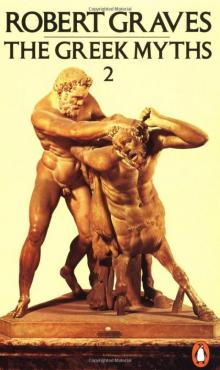 The Greek Myths, Volume2
The Greek Myths, Volume2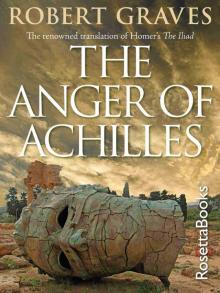 The Anger of Achilles: Homer's Iliad
The Anger of Achilles: Homer's Iliad Count Belisarius
Count Belisarius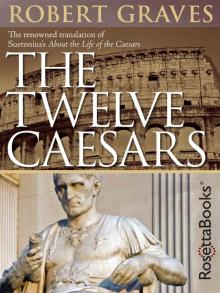 The Twelve Caesars
The Twelve Caesars Complete Poems 3 (Robert Graves Programme)
Complete Poems 3 (Robert Graves Programme) Homer's Daughter
Homer's Daughter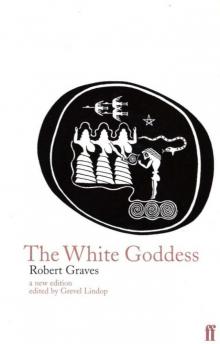 The White Goddess
The White Goddess Goodbye to All That
Goodbye to All That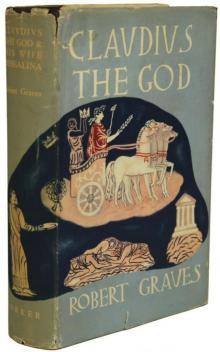 Claudius the God and His Wife Messalina
Claudius the God and His Wife Messalina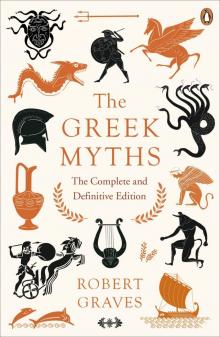 The Greek Myths
The Greek Myths I, Claudius
I, Claudius The Islands of Unwisdom
The Islands of Unwisdom Complete Short Stories
Complete Short Stories The Golden Fleece
The Golden Fleece They Hanged My Saintly Billy
They Hanged My Saintly Billy King Jesus
King Jesus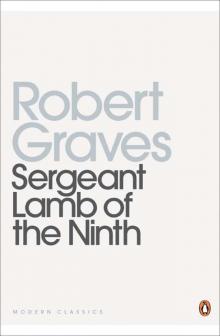 Sergeant Lamb's America
Sergeant Lamb's America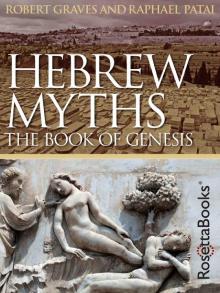 Hebrew Myths: The Book of Genesis
Hebrew Myths: The Book of Genesis Seven Days in New Crete
Seven Days in New Crete Proceed, Sergeant Lamb
Proceed, Sergeant Lamb Claudius the God
Claudius the God Wife to Mr. Milton
Wife to Mr. Milton The Complete Poems
The Complete Poems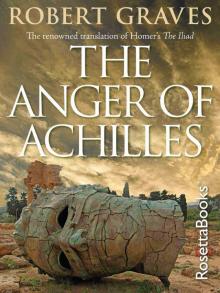 The Anger of Achilles
The Anger of Achilles Claudius the God c-2
Claudius the God c-2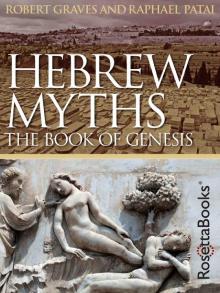 Hebrew Myths
Hebrew Myths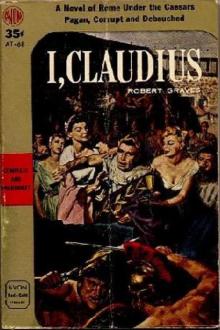 I, Claudius c-1
I, Claudius c-1 The Greek Myths, Volume 1
The Greek Myths, Volume 1